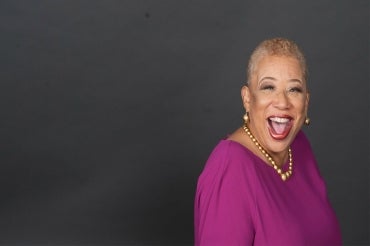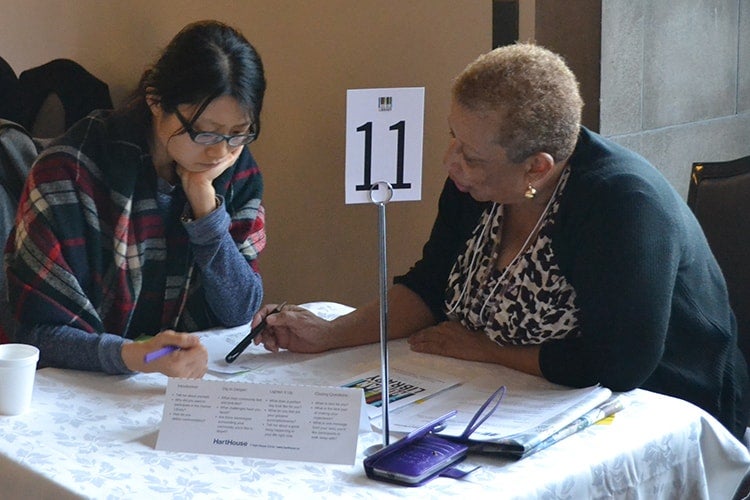Hart House's Human Library challenges visitors to not judge a book by its cover

Published: December 1, 2017
People with questions about community -- what it means to be part of one, or excluded from one – had an opportunity this week to hear a diverse range of perspectives at a "Human Library" at the University of Toronto.
The sixth annual event held by Hart House included 14 “books” – or "human stories," as event organizers prefer to call them – for 20-minute conversations with the public.
People from various backgrounds, communities, races, sexualities, religions and ages made up the human stories on loan Thursday, part of the Deconstructing Communit(ies); Intersecting Identities event.
“It’s an opportunity for us to listen,” says Trish Starling, community engagement facilitator at Hart House who helped organize the event. “It’s an empathy-building exercise as a way to listen and to understand others in a way we can better support each other as we co-exist in Toronto.”
The Human Library concept got its start at Denmark’s massive Roskilde music festival in 2000 as a way to challenge people’s prejudices. Concert goers were asked what prejudices they had and then were partnered up with a human book. The phenomenon caught on, with human libraries having become a popular tool to link different types of people to share stories and knowledge.
Seán Kinsella, co-ordinator of residential transition programs at U of T Mississauga's Student Life & Housing, returned this year with his human story entitled, “How to avoid doing the splits while traveling down a rainbow-coloured river with your feet in two canoes. (Hint: It’s not easy.)”
Kinsella says he identifies with several communities, including Cree, Anishinaabe and Métis Nations, and the wider Indigenous community, the Irish diaspora and 2Spirit.
Other speakers and topics on loan at the Hart House Human Library included: Naeema Hassan, The Battle of Choosing Sides Between My Blackness and My Spirituality; Sapphire Woods, So This Is Why I Talk To Plants; Mike Ormsby, On Being "Ojibberish"; Kate Welsh, Queer CRIP (Queer Community Resistance Intimacy Project); Rudrapriya Rathore, How to Celebrate Dusshera, or a Guide To Being a Rajput Girl; Bidhan Berma, The Last Train East; Elvia Maria Peñate, I’m Not from Here Ni De Allá, My Story of Being a Mestiza, Latinx Queer Woman; Arij Elmi, The Tender-Hearted Badass; Sharine Taylor, home: beyond and between borders; Sandra Whiting, Quitting is Never an Option; Jennifer Hollett, Wait, don’t slam the door on my face; Mitchell George, For Our Generations To Come – Ceremony Saved My Life; and La Toya Dennie, Toya from the block.

Storyteller Sandra Whiting (right) with Lydia Li, a Student Life officer, at Hart House on Thursday. Says Whiting: “Without stories, how would we know who we are?” (photo by Trish Starling)
Sandra Whiting, who grew up in Kingston, Jamaica, says she's always been known among family and friends as a natural storyteller. For most of her life though, her storytelling focused on African and Caribbean folk tales. Now, she says, she is turning to a very intimate source of stories.
“Now I want to tell my stories. I want to talk. I’m shedding like a caterpillar, coming out as a different Sandra who now wants to speak about my experiences.
“Without stories, how would we know who we are?”
She admits it hasn't been easy as an African Canadian woman getting her voice and ideas heard, but that has never stopped her from speaking up. “You don't go there to be safe and not have a voice,” she says.
Kinsella says the Human Library is special because it allows the public to get exposed to voices and perspectives that might differ from their own. “I like to take any opportunities I can to signal boost the work of incredible folks who are Black, Indigenous or the member of a community of colour – especially the voices of girls, women, and 2-spirit folks – whose voices are not necessarily part of the mainstream conversation."



